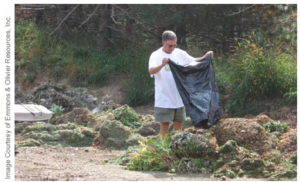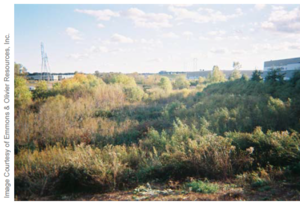
MS4 fact sheet - Residential Waste Collection & Clean-up Programs
Illegal dumping of non-hazardous household waste and improper dumping of yard waste in streets, storm drains, wetlands, lakes, and other water bodies pollutes surface waters. Non-hazardous household waste includes items such as tires, furniture, common household appliances and other bulk items. Yard waste includes any organic debris such as grass clippings, leaves, and tree branches.
Although yard waste is composed of natural materials that will eventually decompose, the debris releases nutrients and uses up oxygen that is necessary for a healthy aquatic ecosystem. Non-hazardous household materials should be recycled or disposed of at a proper facility and yard waste is best minimized and composted.
This fact sheet provides guidance on implementing non-hazardous residential waste and yard waste clean-up and collection programs in order to increase public awareness about the environmental impacts of these wastes to encourage proper disposal.
Contents
Benefits and pollution reduction
Waste collection and clean-up programs can positively change the actions of residents by decreasing the dumping of household materials and yard waste into local surface waters. Yard waste such as grass clippings and leaves, when carried through storm drains or dumped directly into a waterbody, contribute excess amounts of phosphorus to the water, resulting in an increase in the likelihood and severity of noxious algae blooms. Reductions in these pollutants entering surface waters will contribute to improved water clarity, coloration, odor, and fish and wildlife habitat, leading to a more inviting lake for community recreation and enjoyment.
Program development and implementation
Encouraging citizens to responsibly dispose of non-hazardous residential waste and yard waste can be accomplished through:
- Ordinances prohibiting harmful disposal
- Education on why dumping is harmful to water resources
- Efforts to connect citizens with local resources to form a sense of ownership and value
- Organized clean-up and waste collection programs
Owners and operators of Municipal Separate Storm Sewer Systems (MS4s) can combine education with clean-up and waste collection programs for optimal results. For additional program development information regarding illicit discharges, see the Potential Discharge Identification and Risk Reduction fact sheet and for information on preventing disposal of waste in storm drains see the Storm Drain Stenciling fact sheet.
Waste collection programs
Offering designated waste drop off locations or curbside yard and bulk non-hazardous household waste collection provides residents with an environmentally friendly alternative to illegal and illicit dumping of waste. There are a variety of options to look into before choosing the best option for your community. These programs can be set-up and implemented by a municipality which will result in a direct cost up front for additional staffing. Coordination of these programs can be contracted out to a private collection service. Additionally, these programs can be offered free of charge, through pay-as-you-throw fees, or by implementing a seasonal or year-round flat fee added to utility billings.
- Curbside yard waste collection - Many waste haulers in the Metro Area will pick up yard waste for an extra fee. The city of Columbus, Ohio has contracted with a private hauling service to provide a subscription based yard waste collection service to its residents. The resident is responsible for paying a fee for the six month service. Waste is accepted in biodegradable paper bags, rigid reusable containers labeled with “YARD WASTE” or bundles of twigs tied with twine. Residents can place up to 15 bags, bundles or containers of yard waste curbside for a weekly pick-up. If the limit of 15 is exceeded, additional waste can be collected for a fee. Some communities identify a size limit for yard waste that can be picked up curbside. Waste that exceeds the size limit, must be dropped off at a waste facility by the homeowner.
- Yard waste drop off - Designated drop off facilities can be established for yard waste collection. Ramsey County, MN has seven yard waste drop off sites. The sites are open for residents from April through November to drop off yard waste free of charge. Taxes cover the costs of operation and the sites are only available to residents. The County composts a portion of the material and offers it back to residents free of charge. The majority of compost is trucked by vendors to high- capacity compost sites or to farming operations for soil amendments. The County website identifies what wastes are accepted and available at each site.
- Bulk residential waste collection - Bulk waste such as furniture, tires, appliances and other large items have, unfortunately, been found in wetlands and other water resources. A bulk waste collection program can prevent the illicit disposal of these items. The City of Bloomington, MN, has organized a large item and appliance collection program called Citywide Curbside Cleanup where items not routinely collected by weekly hauling services can be placed on the curb for pickup. Residents pay approximately 💲20/year to participate. A similar program in Grand Rapids, Michigan is administered by selling stickers which are attached to the bulk waste that can then be placed for curbside pickup on designated days. The stickers cost 💲7.50 and 💲12.50 respectively.
- Annual waste collection event - Designate a specific day and location for community members to drop-off bulk waste. This event could be coupled with other Earth Day activities in April. Residential hazardous waste collection could also be coupled with this event by working with county hazardous waste departments. St. Louis Park, MN sponsors an annual Spring Clean-up Day. City residents can bring large items such as furniture, tires, remodeling supplies, and appliances to a centralized site. A disposal fee is charged depending on the item. Some items in good condition are collected and redistributed to others for reuse. Other cities offer free disposal service to residents during annual waste collection days.
Awareness campaigns
Awareness campaigns inform the public of the harm caused to surface waters by illegal dumping of residential waste and yard waste. Through awareness campaigns, an emphasis can be made on changing behaviors, stressing the importance of valuing natural resources. Suggested educational methods include:
- Brochures - Develop informative brochures and guidance for specific audiences such as homeowners, landowners, businesses, and garden clubs regarding the yard waste program. The brochure could include supplemental yard waste handling tips. Brochures can be made available at public establishments such as libraries and other municipal buildings, gardening and landscaping stores, and hardware stores. In addition, any of this information could be distributed directly via door hangers, utility bills, or mass-mailed. The information on the brochure could also be made available on a municipality or community website. Suggested topics in education materials may include:
- An explanation of why these disposal practices could harm the environment
- Local yard waste clean-up programs including curbside pickup programs and local collection site locations, hours and materials accepted
- Local burning restrictions for yard waste
- How to compost your own waste (e.g. in bins, worm bins or piles)
- Proper handling of yard waste such as: sweeping up grass clippings and leaves on the sidewalk, driveway, alley or street; leaving grass clippings on your yard; avoid blowing grass clippings and leaves into adjacent water bodies; sweeping up excess fertilizer that lands on your driveway, sidewalk, or in the street; avoiding washing cars with soapy water in driveways that discharge to a storm drain and instead, washing your car on the lawn or at a commercial car wash.
- Signage - Position “No Dumping” signage with information about natural resource protection near common dumping sites, wetlands, and storm sewer inlets.
- Composting education - Provide workshops and educational materials on backyard composting of leaves, grass clippings and other yard waste. Workshops can provide the technical assistance needed to get homeowners started with a backyard compost bin.
Clean-up programs
- Community wide clean-up event - Organize an annual event for volunteers to come together to clean-up wetlands and other water resources through-out the community. The annual event could coordinate with other Earth Day activities in April.
- Adopt-A-Wetland The City of Oakdale, MN has an Adopt-A-Wetland program encouraging individuals, families, school groups, youth groups, businesses and civic organizations to get involved. The program includes an initial education session, spring and fall trash clean-up of the adopted wetland, annual buckthorn removal, monitoring of invasive species and annual feedback to the City. The local watershed district is involved as an additional resource for program participants. The program helps keep wetlands throughout the city clean year-round and participants gain a sense of pride and ownership in their local water resource.
Maintenance considerations
Maintenance considerations will vary depending upon the type of program implemented. If a municipality decides to implement a yard waste collection program, maintenance will need to be considered for additional trucks, residential yard waste bins, and other pick-up equipment. Signs posted in public areas will need to be monitored for graffiti, destruction, and natural wear and fading.
Typical cost
Costs will vary depending upon the type of program that is implemented. The implementation of a waste collection program will take time and effort on the part of municipal staff and may demand the need for additional staff. In order to implement a municipally run program, collection trucks and equipment as well as a composting facility will need to be acquired. This could result in a significant cost up front. However if a fee is being charged to residents for the service, the cost of maintaining the service could be covered. Costs for educational materials and community wide events could be offset by local business sponsorships while encouraging the participation of additional community members.
This page was last edited on 26 January 2023, at 11:15.

